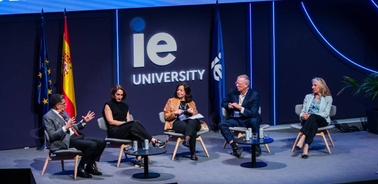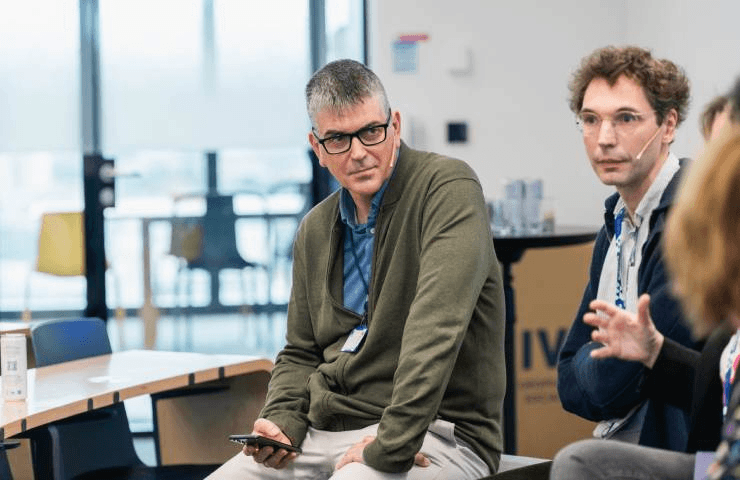- Home
- Civica
- Civica News
- Ie School Of Science & Technology Challenges Traditional Stem Education At The Civica Global Forum: “adaptability Is Key”
IE School of Science & Technology challenges traditional STEM education at the CIVICA Global Forum: “Adaptability is key”

The School proposed redesigning scientific and technological education at the CIVICA alliance flagship event.
IE School of Science & Technology took part in the CIVICA Global Forum, held on May 6–7, 2025 at IE Tower, IE University’s vertical campus in Madrid. The event served as a hub for innovation and knowledge, bringing together more than 450 representatives from the private sector, academia and civil society. Under the theme “Leveraging Social Sciences in Higher Education: Navigating Global Challenges and Complexities”, the forum featured thought-provoking discussions on integrating social sciences and technology, working towards European competitiveness and leveraging partnerships to transform higher education.
By hosting the CIVICA Global Forum, IE University—alongside the other nine European universities in the CIVICA alliance – The European University of Social Sciences – reaffirmed its role as a key player in shaping the future of European higher education. The event marked a milestone in IE University’s leadership within CIVICA’s global outreach efforts, consolidating its commitment to international collaboration, critical thinking, and the vital role of the social sciences in driving societal transformation in Europe and beyond.
IE School of Science & Technology addressed some of today’s most pressing challenges, including the rise of artificial intelligence (AI) and its impact on higher education. The integration of AI in curriculum design and the student learning journey has sparked a debate on the role of humanities and social sciences in providing a more human-centered and ethical approach to technology. Rafif Srour Daher, Executive Vice Dean of the School, and Guillermo del Haro, Vice Dean for Graduate Programs, advocated for a multidisciplinary approach to provide students with core abilities to navigate global societal and technological challenges.
In the plenary “SHAPE & STEM: Molding New Generations of Global Changemakers”, Rafif Srour Daher urged for a deeper convergence of social sciences and humanities with technology, emphasizing the need for a full integration of disciplines beyond mere coexistence. “When we teach about global challenges, we should do it through the lenses of environment and public policy”, she claimed. She also highlighted the value of adaptability, which she considered “key”, especially for STEM students, “because technology is changing so fast”. Students need to graduate with strong adaptability skills to thrive in the real world, she explained.
Other speakers included Julia Black, President of the British Academy; Karim El Aynaoui, Executive Vice-President and President of the Policy Center for the New South of the Mohammed VI Polytechnic University and Dean of Humanities, Economics and Social Sciences; Trevor Walton, Co-Founder of the Mediterranean Screen Arts Academy; and moderator Susana Torres, Professor of IE School of Humanities. Condemning the under recognition of social sciences and humanities, Julia Black urged students and professors to vindicate their relevance, noting these disciplines are “not in opposition to STEM”. Furthermore, Trevor Walton advocated for gender equality in technological and scientific fields, a position echoed by the Vice Dean of the School. Karim El Aynaoui additionally emphasized that value and ethics are “essential ingredients” in modern education, which aspires to reach a wider scope of citizens.
An additional panel titled “Harnessing AI for Transformative Education and Social Sciences Research” explored the impact of AI on academic research, including ethical and public policy implications. Guillermo de Haro led a discussion that featured Jean-Phillipe Cointet, Director of the Open Institute for Digital Transformation of Sciences Po; Huy Dang Manager of the Data Sciences Lab at the Hertie School; Concepción Díaz, Responsible for AI Trainings for EMEA in Google; and Claire Gordon, Director of LSE Eden Center for Education Enhancement at the London School of Economics.
Guillermo de Haro highlighted the broader significance of AI in this space: “AI is not just a tool for efficiency, it’s a catalyst for reimagining how we teach, learn, and research in the social sciences. It challenges us to rethink methodologies, ethics, and the very role of education in shaping society.” On the tensions inherent in developing these systems, he added: “The Bias Paradox: We want AI to be like humans, but without the human biases.”
